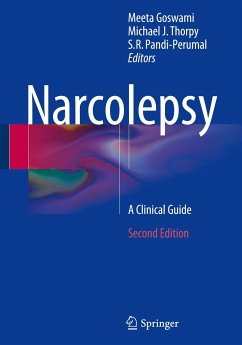
Meningitis and Encephalitis
Management and Prevention Challenges
Herausgegeben: Hasbun, Rodrigo

PAYBACK Punkte
49 °P sammeln!
Meningitis and Encephalitis are associated with high rates of mortality and neurological sequelae. The differential diagnosis includes a wide spectrum of infectious and non-infectious etiologies, some requiring urgent therapy for survival. The current management challenges in patients with meningitis and encephalitis include a low sensitivity of meningeal signs, overutilization of unnecessary screening cranial imaging, delays in diagnosis of urgent treatable causes, a large proportion of unknown etiologies, low sensitivity of current microbiological techniques especially in the setting of prev...
Meningitis and Encephalitis are associated with high rates of mortality and neurological sequelae. The differential diagnosis includes a wide spectrum of infectious and non-infectious etiologies, some requiring urgent therapy for survival. The current management challenges in patients with meningitis and encephalitis include a low sensitivity of meningeal signs, overutilization of unnecessary screening cranial imaging, delays in diagnosis of urgent treatable causes, a large proportion of unknown etiologies, low sensitivity of current microbiological techniques especially in the setting of previous antibiotic therapy, underutilization of available molecular diagnostic tests, and empiric antibiotic therapy and hospitalization for viral meningitis cases. Even though there are published guidelines, compliance with them is not optimal and physicians do not follow standardized algorithms in their empirical approach. As meningitis and encephalitis is associated with high rates of adverse clinical outcomes, prevention, when feasible is of upmost importance. Adherence to protocols to prevent health-care associated meningitis and ventriculitis are effective but compliance with them is not uniformly performed.
This book seeks to improve outcomes for meningitis and encephalitis cases handled by physicians who may or may not be thoroughly trained for these challenges. The text introduces the current guidelines but also discusses the gaps that leave clinicians struggling to implement the most appropriate approaches for these particular neurological infections. Each chapter delivers the tools necessary to identify and adhere to the most appropriate diagnostic technique, management protocols, and prevention approach for each situation. All chapters conclude with discourse on future directions in research and quality improvement. Written by experts in infectious diseases, the book covers topics that are the most devastating, includinghealthcare-acquired infections, autoimmune encephalitis, and infections as they present in HIV patients.
Meningitis and Encephalitis is a well-rounded resource for all medical professionals encountering these neurological syndromes, including infectious disease specialists, neurologists, primary care physicians, and immunologists.
This book seeks to improve outcomes for meningitis and encephalitis cases handled by physicians who may or may not be thoroughly trained for these challenges. The text introduces the current guidelines but also discusses the gaps that leave clinicians struggling to implement the most appropriate approaches for these particular neurological infections. Each chapter delivers the tools necessary to identify and adhere to the most appropriate diagnostic technique, management protocols, and prevention approach for each situation. All chapters conclude with discourse on future directions in research and quality improvement. Written by experts in infectious diseases, the book covers topics that are the most devastating, includinghealthcare-acquired infections, autoimmune encephalitis, and infections as they present in HIV patients.
Meningitis and Encephalitis is a well-rounded resource for all medical professionals encountering these neurological syndromes, including infectious disease specialists, neurologists, primary care physicians, and immunologists.














